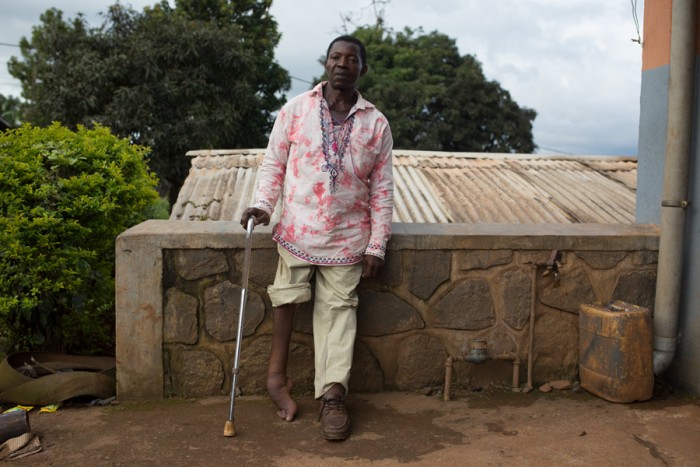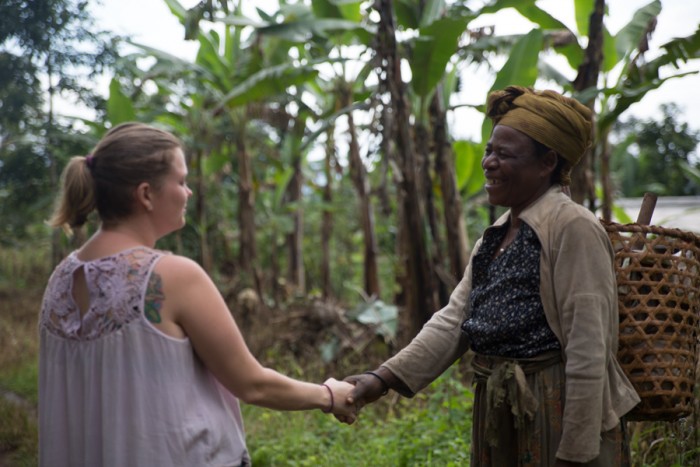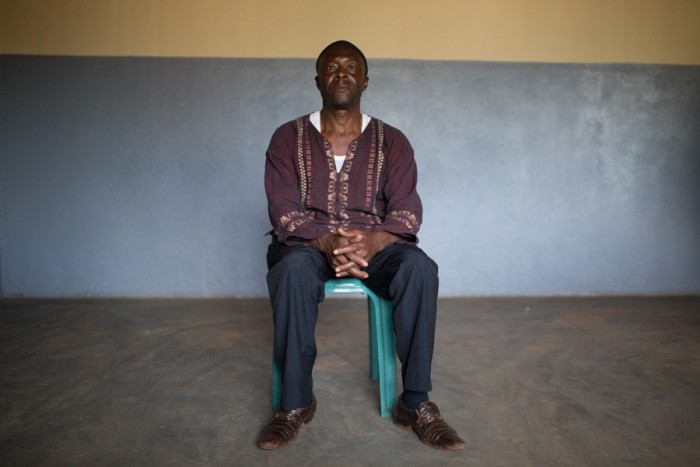September 8th, 2016 by Rachel | Tags: Peace Corps, Peace Corps Volunteer Stories | No Comments »
As I was inspired by the Peace Corps Legacy video series, I created a video sharing a story of a volunteer, Claudine Hennessey, who served at Alex’s post 11 to 13 years ago, and the community members. Thank you Alex for sharing Claudine’s story with me and taking care of all the logistics which included arranging interviews with three community members who worked with Claudine and had their lives changed by her. Thank you also to Claudine and also Awal who is featured in the video for sharing photos with me.
To view the Peace Corps Legacy video series, click here.
September 7th, 2016 by Rachel | Tags: Disability, Peace Corps, Persons with Disabilities of Cameroon, Photography | No Comments »
During the last seven months of my Peace Corps service, I am featuring photographs and stories of several persons with disabilities living in Cameroon. All the photos are part of a series called “Persons with Disabilities of Cameroon.” The goal of presenting photographs and their stories is to create better awareness about the plights that persons with disabilities face in a developing country. When I return to the US, I hope to exhibit this series in a gallery and publish a book to educate others about persons with disabilities living in developing countries as this topic is so rarely discussed in the media.
“My disability came from an accident. I fell from a height and hurt my leg. I jumped from a wall. Police was chasing me and people because of a political unrest. I climbed over a wall to escape the violence. My right hip was fractured since 2008.
I went for an x-ray. X-ray showed that I have a fracture on my right hip. I started treatment in the hospital. They gave me pain killers. Then I went to a native practitioner. Since then I have been disabled. I had to stop working. I was a radio technician. I fixed electronic equipment. I can’t sit for long time. I also have eye problems. I can’t see the equipment now.
I cannot move like a normal person. I cannot carry out activities like a normal person. I cannot move far distance.
I am in a need of support. I want to start a poultry and pig farm to support my five children and eight grandchildren. I need assistance to sustain my life and my family. Life would be better for me if I can set up a poultry farm. Farming would be easier for my body.”
September 5th, 2016 by Rachel | Tags: Disability, Peace Corps, Persons with Disabilities of Cameroon, Photography | No Comments »
During the last seven months of my Peace Corps service, I am featuring photographs and stories of several persons with disabilities living in Cameroon. All the photos are part of a series called “Persons with Disabilities of Cameroon.” The goal of presenting photographs and their stories is to create better awareness about the plights that persons with disabilities face in a developing country. When I return to the US, I hope to exhibit this series in a gallery and publish a book to educate others about persons with disabilities living in developing countries as this topic is so rarely discussed in the media.

I interviewed a gentleman named Martin who became disabled from polio. He shared his story with me about his struggles in living with a deformed leg.
What is your disability?
I am paralyzed in my right leg.
What is the cause of your disability?
Polio. In 1965, I was five years old at the time. I was sick and then injected with quinamax. And that caused paralysis of the right leg. After the injection, I could not walk.
How did you react?
I was very angry and I cried. My future was destroyed.
What difficulties do you face today?
Financial. Because I am a trade and agriculture technician. I can carry out several income generating activities. I have inherited land from my father. I have built a house on the land. I need financial assistance to carry out agricultural activities to support myself and family. My disability stops me from earning enough money because I can’t go to the field often and work with field workers because the field is far from my home. I need more money for transportation to go to the field because I can’t walk long distance.
I have many projects I want to do that requires money but because I earn less money than people without disabilities, I cannot realize the projects.
September 4th, 2016 by Rachel | Tags: Peace Corps | 2 Comments »
Shortly before I departed for Cameroon in September 2014, I spent many hours reading blogs written by Peace Corps Volunteers serving in Cameroon so that I could be well prepared for my service and know what to expect. I went to Peace Corps events in my hometown so that I could meet Returned Peace Corps Volunteers and learn more about their experiences. I asked many questions in a Facebook group for volunteers who were departing to Cameroon at the same time as I was. While one could spend so many hours trying to digest so many information to be well prepared for integrating into a culture that is so different from our own culture and living in a new environment, the experience will be different from what one may imagine.
While you may face cultural shocks when first arriving in Cameroon, you will also discover many beautiful treasures in this country. You will meet new people who will become your best friends and will teach you how to love Cameroon. You will find gorgeous sceneries that are worth photographing which includes starry nights, sunrises over the mountains, and waterfalls. You will eat tasty food such as beignets, spaghetti omelet, fresh beef skewers, and fresh grilled fish. You will hear vibrant music and learn new dances. You will build great partnerships with Cameroonians who are so motivated to see positive changes in their communities.
I work as a Community Health Educator. The work of health volunteers is very diverse. While some volunteers like myself work for an NGO in a large city, some others work for a small local health clinic in a village, a large regional hospital in a city, or an HIV treatment center in a town. We work with various populations which includes people living with HIV/AIDS, orphans and vulnerable children, persons with disabilities, mothers, adolescences, and girls. However, we do all share a commonality in our work – we provide education about various health topics such as HIV, malaria, nutrition, maternal care, and sexual reproductive health to our community members. We organize a group of community members to come together at a local health clinic or outside by a shop and teach them how to prevent HIV and eat well-balanced diet meals. We visit homes to check to see if community members are using their mosquito nets and explain the importance of sleeping under them. We visit schools and care groups and teach them about sexual reproductive health and family planning. Some also do vaccine campaigns and assist healthcare workers in visiting homes to provide vaccines to children. Some also set up HIV testing events to provide free-HIV testing to community members. Some also speak on the radio to raise awareness about various health topics. Because we organize so many exciting projects and activities, each work day is unique. No day is the same.
While you will learn about the Cameroonian culture, Cameroonians will also learn from you about the American culture. I taught them how to make pizza, brownies and chocolate chip cookies, and they loved them. I also hosted American holiday celebrations such as 4th of July and Thanksgiving to teach them about US history. I brought printed pictures of my family and home life in the US so that they could see how Americans live their life in the US. Most of the Cameroonians who you will meet will have otherwise never met a foreigner if it weren’t for our courage and willingness to live in far-flung places.
You will be challenged but you will be rewarded. Let your Peace Corps service surprise you. Don’t underestimate your own abilities. You will realize that you can push yourself against various barriers you may face. However, give yourself patience when integrating into an unfamiliar community. Give yourself time to grow professionally. Every volunteer is an individual who thrives differently at their own pace. While you may face frustrations when implementing projects or speaking a language with which you did not grow up, you will eventually see positive moments such as community members exhibiting improved knowledge through tests that you may administer, utilizing their newfound knowledge by making soy milk or growing moringa, or changing their behavior and sleeping under the mosquito nets. Your two years will be both your longest and shortest time of your life.
September 4th, 2016 by Rachel | Tags: Peace Corps | No Comments »
People have said to me, “There are already so many problems in our home. Why can’t you just stay and help here?” Yes, while the US does have its own share of problems, and there are already Americans working to help solve issues in their home country, there are still many benefits to helping people abroad.
In the Peace Corps, volunteers are sent to far-flung places where people would have otherwise never met foreigners and learned invaluable skills. While the internet, books and television can teach people lessons, there is one thing it cannot do and that is touch people with feelings. It cannot empower people to feel that they are important to the world because they have talents and skills to offer to all.

A Peace Corps Volunteer meets a Cameroonian. By meeting each other, they learn about each other’s culture and form friendships.
By having people from two different worlds connect with each other face to face, they can learn about each others’ cultures and break stereotypes. As they teach each other about their own cuisine, their own manners, how they manage their own work places, they build friendships with each other. As result, when friendships have been formed, they contribute to creating peace. While the media only shows a small image of different places, host country nationals and volunteers can shatter stereotypes through storytelling. When volunteers go home to America, they can say, “When I lived in the country, this is what I saw through my own eyes.” Host country nationals can meet with other community members and say, “When I was friends with this volunteer, I learned that in the US, they do this.” When volunteers see positive images of their host country, they share the treasures they discovered through social media and conversing with family and friends in the US to educate them that the world is not always a horrible place. However, when they discover negativity, they not only do still share it with their fellow Americans, they also see it as a motivation to make the world a better place. Host country nationals learn the positive images through seeing how the Americans are gracious by providing them with new knowledge and skills. When Americans share their issues that exist in their homeland with the host country nationals, the host country nationals learn that Americans are not superior to anyone else in the world.
Many practical skills are also harder to teach through the internet, books and television. Examples include teaching community members how to plant vegetables, produce honey, sleep under a mosquito net, conduct science experiments, and practice speaking English. While the information may be readily available through the internet, books and television, community members may miss out on the information due to being illiterate or having limited time to watch television or read books. Examples of important information may include how to eat a well balanced diet, exclusively breastfeed, and prevent HIV transmission.
Volunteers also learn new skills abroad and bring them back home to utilize them in their home country. Examples include monitoring and evaluating progress, working with disadvantaged children, and conducting needs assessment.

